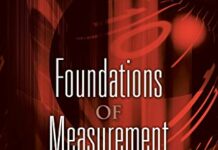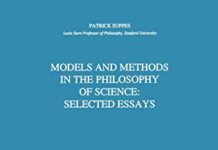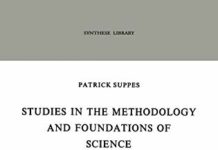
Ebook Info
- Published: 2012
- Number of pages: 338 pages
- Format: PDF
- File Size: 12.82 MB
- Authors: Patrick Suppes
Description
Part I of this coherent, well-organized text deals with formal principles of inference and definition. Part II explores elementary intuitive set theory, with separate chapters on sets, relations, and functions. Ideal for undergraduates.
User’s Reviews
Reviews from Amazon users which were colected at the time this book was published on the website:
⭐It is incredible how some books, written long ago, are still useful. Well, Suppes’ «Introduction to Logic» is one of those rare specimens.I bought it looking for a book that could make my students think for themselves as well as getting excited by the wonderful subject which is logic (deductive reasoning). Its explanations are very clear and solid. The first part which covers propositional and first order logic is presented quite extensive and rigorous. The downside is that there is no metatheory, i.e. there are no proof of the important theorems. This could be understandable since the book has for primary audience first year undergraduates. Another downside of this book is that a large part of the exercises are very difficult to solve because the theory that preceeds them is not enough to know how to proceed. I mean this: at the end of every chapter there are exercises, the problem is that a great amount of these exercises require to know more theory than what is there.Part II, naive set theory, is delightful. The chapter on functions is just very stimulating. For anyone curious, without mathematical background, to know some set theory this part is suitable. It has one of the downsides of Part I, some exercises are not easy to solve since the theory given is not enough. Nevertheless, the presentation is quite good. Anyone interested in a rigorous set theory can buy the author’s «Axiomatic set theory».Even though I have mentioned some cons of Suppes’ book, I still considered it as one of its kind. I mean, it may have no metalogic, but it is still a competent book.
⭐It is Thanksgiving in America today and I thought it fitting to leave a review of this excellent book. Patrick Suppes died two days ago at the age of 92. Suppes comes from a tradition of brilliant philosophers who excelled in many fields (most notably mathematics and logic in Suppes’ case). His body of work, which can be found at Standford (suppes-corpus), is truly remarkable. This book, along with his Set Theory book were staples in my educational foundation. There are many great logic texts available, but over the decades I’ve found no logic book more useful for applying logical/critical thinking in both non-mathematical and mathematical contexts. Both books are challenging and require effort from the reader, but 100 pages into both and you’ll notice how differently you think and how problems in other books/contexts become tractable. In regards to his Set Theory book, only Enderton’s book is on par, imho.So much more can be said, but I’ll close by stating that I’m thankful for Suppes’ lifelong dedication and simply want to acknowledge the contribution it has made in my intellectual and professional development.
⭐I am enjoying working through this book, but as others have indicated, you should not attempt this book unless you have a fair amount of logic under your belt. I have just finished the chapters on natural deduction for predicate and propositional logic and the instruction is lacking. I have taught this subject at the college level since the fall of 1989 so that is not a problem for me. But without my background, I would be lost. Otherwise, the end of chapter exercises are interesting, and the range of subjects covered is impressive.
⭐I recommend this book to philosophy students who study philosophical logic and wish to get into mathematical logic. The system of natural deduction he uses is not explained in much detail, but as long as you have learned at least one system of natural deduction and perhaps even the tree method of proof, you should be fine. His definitions and explanations of terms and of how one develops logical rules are excellent. There is also a treatment of informal proof methods that mathematicians use, a section on basic set theory, and a section on axiomatizing scientific theories–the latter hinting at some of Suppes’ own philosophical ideas.
⭐As someone interested in the foundations of math I own several logic books including Mendelson and Hilbert. My two favorites were written by philosophers: “A Profile of Mathematical Logic” by Howard Delong” and this book by Suppes. Every math major can benefit from seeing philosophical treatments as well as mathematical treatments. For what it covers (including basic set theory!) Suppes’ book is the best.
⭐This book offers a great intro into the field that is Philosophy. The logic sets and chapters are broken down well; however, I would advise anyone seeking to enter the field of philosophy to honestly find a buddy to talk with about these topics. More specifically about the product, It arrived on time and in good condition. I would not expect anything else.
⭐Suppes is a reference in the foundations of Maths (Logic and set theory). This Introduction to Logic is actually an introduction to his “Axiomatic Set Theory”, a reference on the topic. His language is clear, and yet mathematically precise.Nice purchase, nice reading.
⭐This book was torn and missing pages at the beginning. Immediately got a refund and returned this book.
⭐Just what I wanted.
⭐Loved it! It’s really good to learn logic!
Keywords
Free Download Introduction to Logic (Dover Books on Mathematics) in PDF format
Introduction to Logic (Dover Books on Mathematics) PDF Free Download
Download Introduction to Logic (Dover Books on Mathematics) 2012 PDF Free
Introduction to Logic (Dover Books on Mathematics) 2012 PDF Free Download
Download Introduction to Logic (Dover Books on Mathematics) PDF
Free Download Ebook Introduction to Logic (Dover Books on Mathematics)


